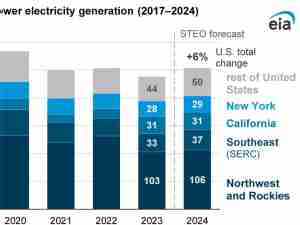Papua New Guinea Grasps at Its Own Gas as LNG Exports Surge
By: Dan Murtaugh and Perry Williams | Mar 06 2017 at 03:34 AM | Liner Shipping
Less than three years after it began sending one of its most precious resources overseas, Papua New Guinea’s future may be determined by how much of it stays at home.
The Pacific island nation wants some of the world’s top explorers to allow a portion of its natural gas to stay in the country, said Nixon Duban, the minister for the government’s petroleum and energy department. The fuel pumped from remote mountain ranges and forest-covered hills could spur industries, generate cheaper power for an electricity-starved population and even help catch tuna. But not at the cost of driving away drillers.
“The challenge our government faces is finding the right balance,” Duban said in an interview in Port Moresby, the capital of Papua New Guinea. “We’re trying not to dictate against the energy industry.”
Duban’s caution is understandable. The developing country of less than 8 million people is one of the poorest in Asia, with soaring crime rates, high unemployment, and almost half the population living in squatter settlements. It’s counting on energy resources to boost finances, and needs foreign investment. Its exports have led to some signs of prosperity, with Port Moresby turning home to a luxury hotel and a major mall as well as hosting international sporting events.
$19 Billion Project
Still, more sustained development will mean using some resources for itself. When the government signed deals almost nine years ago that led Exxon Mobil Corp. to build a liquefied natural gas terminal, it allowed the energy giant and its partners to export all of the gas it found. The project’s $19 billion price tag was more than the country’s annual gross domestic product. The LNG now lights the homes in metropolises including Tokyo, Beijing and Taipei.
The concession was made because the country was unproven as a gas exporter at the time, Prime Minister Peter O’Neill said in an interview in Port Moresby last week. In the past, “we allowed all the gas to be exported,” he said. “Now we want to secure some to go to the petrochemical industry.”
The government is in talks with commodity trading firms such as Japan’s Itochu Corp. and Sojitz Corp. to build petrochemical factories near the capital that will convert gas into methanol, Duban said. He recently negotiated with drillers on one lease to keep 15 percent of the gas for the domestic market, and will look at each lease on a case-by-case basis to make sure the projects are still attractive to the industry. Brent crude, to which LNG prices can be linked, has fallen by half since mid-2014 and traded at $55.46 a barrel at 8:23 a.m. in London.
Itochu is considering the methanol project but nothing has been decided, a Tokyo-based spokesman said. Sojitz is currently considering whether to build a methanol facility in the country and is performing a feasibility study for the facility, according to its spokesman.
Power Outages
The government is also aiming to electrify 70 percent of the country by 2030, and while it wants all of it to come from renewable sources, natural gas could provide a bridge or alternative to reach its goal. Just 13 percent of the population has access to electricity, and even then it’s not uncommon for power outages to strike multiple times a day, forcing businesses to invest in expensive back-up diesel generators.
There’s already one industry in the nation that could benefit from a stable supply of electricity—tuna canning. One-tenth of the world’s tuna is caught off the shores of the country, with estimates putting the value of Papua New Guinea’s yearly catch at $1.3 billion. If the canneries have access to cheap, affordable power, the businesses could thrive, said Mark Baker, Australia & New Zealand Banking Group Ltd.’s managing director for Papua New Guinea.
He cautioned that the country must be wary of the phenomenon known as the ‘resource curse,’ where mineral and fuel-rich nations tend to have worse economic growth, political stability and development than those with fewer natural resources.
“They need to use their resources to invest in broad-based growth,” Baker said in an interview in Port Moresby. “The government is trying to avoid the resource curse, and that can only happen when you invest in infrastructure like power, ports and roads.”








